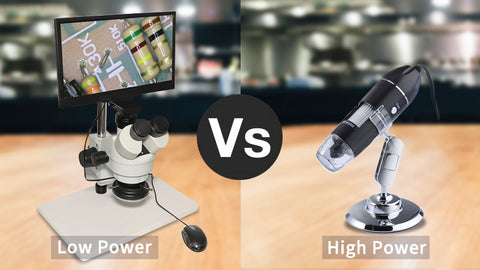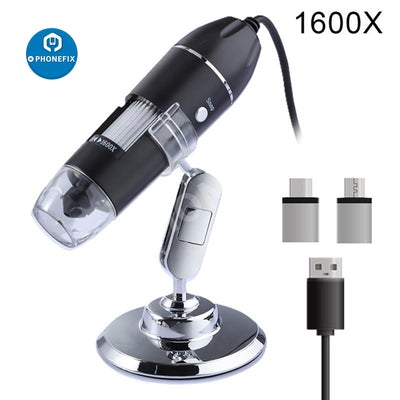Low Power Microscope Versus High Power Microscope
For
the uninitiated, there are two types of microscope: the low power and
high power. Toady, we will take about the topic in detail and look into the
type of microscope which fits your needs before you make a purchase. 
Although both are useful for the applications they were designed for, high power microscopes are more popular not only to professionals, but to hobbyists and children as well.
This
can be attributed to the fact that “invisible” things can be observed,
thus presenting a more exciting experience for the user.
Low Power Vs High Power Microscopes
1. High power microscopes
High power microscopes on the other hand are used to look at things that are way too small for the naked eye to see.
Examples
include blood cells, bacteria and tissue. Also called compound
microscopes, high power microscopes are able to magnify objects up to
1000x microscope.
Recommended High Power Microscopes
8 LED USB 1600X Digital Microscope
The microscope comes with 1600x magnifies, built in 8 LED light, so can capture clearly details.
This
portable microscope is a perfect toy for kids to explore micro world,
also suit for people who love observing insects, skin, PCB and many
interesting objects.
You also can use it for Scal examination,
Textile Inspection, Jewelry Inspection, Collections/ Coin Inspection,
Printing Inspection,or PCBA Inspection and so on.
It has Photo and video production, is the best choice of small objects recognization.
2. Low power microscopes
Low
power microscopes are essentially used to look at larger objects such
as rocks, coins, insects, stamps, rocks, soil, fabric weaves, and the
like.
They are also called “Dissecting” or “Stereo” microscopes.
Stereo microscopes have dual eye-pieces and have the capability of
magnifying specimen 10x to 50x. In effect, the user can view the object
in three-dimensions.
Recommended Low Power Microscopes
A. Integrated Trinocular Stereo 10X-150X Microscope
1. 10X-150X simul-focal trinocular stereo microscope head with continuous zoom WF10X/20 eyepiece auxiliary objective lens,
2. HD 1080P 5MP integrated trinocular stereo white microscope with LCD display screen, 8 horizontal and vertical grid lines,
3.
Color thickness adjustable and movable, 1080P 5MP Lab industrial
simul-focal trinocular stereo microscope for mobile phone PCB soldering
repair
Equipment:
Observation Head: inclined at 45, and
the viewing binocular observation head can make 360, the adjustment
range of interpupillary distance: 54-76mm.
Both eyepiecestalk visibility can be adjusted, and adjustable range is ±5 diopters, trinocular spectroscopy imaging
Eyepiece: wide field, high-point eyepiece WF10X20, it can observe image of observation specimen with glasses
B. DDL Digital Smart 1X-400X Microscope
DDL
Digital smart microscope can achieve the combined magnification effect
of 1-400x, single objective magnification of 1-100x, electronic
magnification of 1-4X.
It will ensure the mentioned Wi-Fi connection, can be connected to a phone, tablet or computer and can display images directly.
In terms of battery life, the single can last for 2 hours. The monomer comes with LED light source.
The Importance of The Light Source
What
most beginners forget is the source of light in every microscope. A
good light source means that one is able to view specimens in a very
detailed manner, with clearer and better image quality.
Microscopes
available in the market today typically have a built-in light source,
although a common entry level microscope might use a mirror in order to
outsource light from the environment.

Those with illumination fresh out of the box may have halogen bulbs, fluorescent, tungsten, or LED Ring light . Tungsten systems are more affordable than the fluorescent bulb, but the latter heats up less and is significantly brighter.
The
above-mentioned models are recommendations for first-time buyers. It
should be noted that there are still a hundred or more models of stereo
and compound microscopes that one can choose from. The real choice is
all yours to make.
If you have any questions about choosing the
right microscope for your school, please contact our Technical Support
Team via Whatsapp: (+86)18173683928 OR https://www.facebook.com/PHONEFIXTeam
.jpg)
Comments
Post a Comment